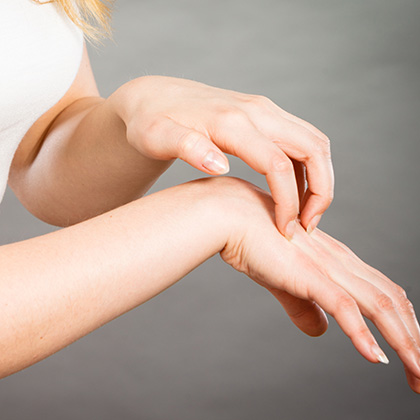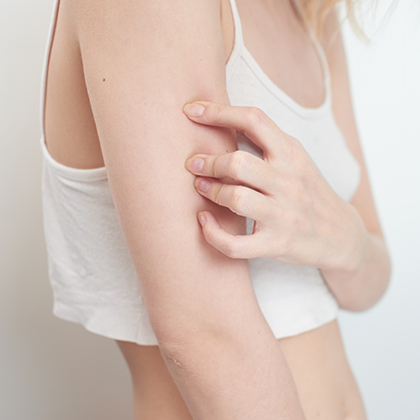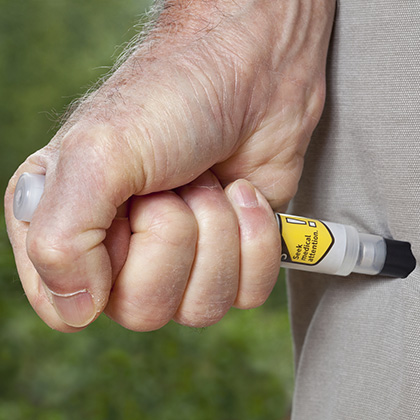According to the Psoriasis Association, two to three percent of the UK population are affected by this condition, which causes red, raised, flaky, scaly and often itchy patches of skin. That’s the equivalent of up to 1.8 million people in this country (worldwide, around 125 million people are thought to be affected (ii)).
Patches of psoriasis can affect any part of the body, but usually appear on elbows, knees, scalp and lower back. The condition’s severity varies from one person to another, with some people mildly affected and others finding it impacts their lives significantly.
Psoriasis can affect you at any age, though experts believe it most commonly starts in adults – men and women are affected equally – who are younger than 35 years old (iii).
Besides the physical discomfort of having psoriasis, the condition can affect your emotional, social and personal wellbeing too. Many people who have psoriasis feel embarrassed about their condition and, as a result, lack self-esteem. And to make matters worse, many people who don’t have psoriasis believe the condition is contagious – which doesn’t make things any easier for those who have it.
Here are some other quick facts about this condition:
-
Experts believe there may be a genetic element to psoriasis as it can run in families – if one parent has psoriasis, there’s a 10 percent chance their child will develop it; if both parents have it, that chance increases to 50 percent (iv).
-
According to the National Psoriasis Foundation in the US, at least 10 percent of the general population inherits one or more of the genes that create a predisposition for psoriasis, but only two to three percent of the population develops the condition (iv).
-
Psoriasis cannot be spread from one person to another, by touching or kissing, for instance, or by sharing food or drinks.
-
Some people with psoriasis also develop a type of arthritis called psoriatic arthritis, which causes pain and swelling in the joints.
-
People who are affected by psoriasis can have periods when they have no symptoms (or very mild symptoms), as well as flare-ups when their symptoms are worse.
-
If you have psoriasis you may also have a higher risk for certain other health problems, including heart disease, diabetes, heart attack, Crohn’s disease, obesity, high blood pressure and depression.
Types of psoriasis
Psoriasis is caused by overactive immune system cells that speed up the turnover of skin cells (normally, skin cells replace themselves every 21 to 28 days, but with psoriasis this process only takes three to seven days (v)). Since your skin can't shed the dead cells quickly enough, they form silvery white scales that can pile up in big, raised, itchy patches.
There are several types of psoriasis – here are the main ones:
Plaque psoriasis
This is the most common type, affecting 80-90 percent of sufferers (vi). It’s named after the clumps that form on the skin as a result of a build-up of skin cells, called plaques. Plaque psoriasis is mostly found on the elbows, knees, lower back and scalp – though you can get it almost anywhere. Like other forms of psoriasis, you may experience different degrees of plaque psoriasis, ranging from mild to severe.
Guttate psoriasis
This is the name for little scaly patches that appear on many parts of the body (the name comes from the Latin guttae, which means drops). Some people find the condition causes itching and soreness, and the patches can be bright pink or red in those with fair skin, or darker and less red in those with darker skin types.
Guttate psoriasis usually affects the torso, back and limbs, and is mostly seen in children, teenagers and young adults (though it can affect anyone of any age). It usually clears up after a few weeks or months, and some people find it never comes back while for others it can lead to one of the other types of psoriasis.
Pustular psoriasis
This type of psoriasis appears as pus-filled blisters, often on the hands and soles of the feet (palmoplantar pustulosis affects the hands and feet, while the rarer generalised pustular psoriasis is more widespread across the body). The blisters tend to be filled with yellow or cream-coloured fluid, and turn brown or crusty after bursting. The condition can be painful, and make everyday activities difficult (even walking, if the blisters are on the feet).
Nail psoriasis
Around half of all people with psoriasis have nail psoriasis (vi), which affects the finger or toe nails. Pitting of the nail’s surface – where small dents appear – is a common symptom, though you may also be affected by nail discolouration, splitting or thickening nails, nails that crumble easily or your nails may come away from the nail bed (onycholosis).
Scalp psoriasis
This is similar to plaque psoriasis but found on the scalp, with thicker patches of skin and dandruff-like flakes. It can make your scalp feel tight and itchy, and if severe it can cause hair thinning too.
Meanwhile, psoriatic arthritis is an inflammatory arthritis that’s associated with psoriasis. It affects up to one in five psoriasis sufferers (vii) and causes pain and swelling in the joints. Psoriasis symptoms are also very similar to eczema symptoms, so it's important to understand the difference.
Living with psoriasis
Nobody knows exactly why some people develop psoriasis. But we do know there are many things that can cause it to flare up, including having a sore throat, not getting enough sleep, working too hard or having a shock (such as after being involved in an accident or getting bad news).
There is no cure for psoriasis. However, the good news is there are several things you can do to help prevent a flare-up or control your symptoms, including the following:
Moisturise often
It’s important to keep your skin moisturised if you have psoriasis, as letting it get too dry can make it more itchy and irritated. Use a rich moisturiser to make your skin feel more comfortable. Also avoid using soap, which can dry your skin out. Instead use a mild skin cleanser suitable for sensitive skin or an emollient cream or lotion.
Use warm – not hot – water
If you enjoy a long soak in a hot bath, it could be making your psoriasis worse. Instead, bathe or shower in warm water, as hot water can irritate your skin. Use a mild body cleanser instead of perfumed soaps or gels, and avoid rubbing your skin when you towel dry.
Avoid irritants
Certain skincare ingredients can irritate some psoriasis sufferers’ skin. Here is a list of some of the most common irritants – if you think a product you’re using on your skin is making your psoriasis worse, check to see if it contains any of the following:
-
Beeswax
-
Hydroxybenzoates
-
Propylene glycol
-
Benzalkonium chloride
-
Imidurea
-
Polyethylene glycol/macrogol 1000 monostearate and esters
-
Benzyl alcohol
-
Industrial methylated spirits
-
Sodium lauryl sulphate SLS
-
Butylated hydroxyanisole
-
Isopropyl palmitate
-
Sodium metabisulphate
-
Butylated hydroxytoluene
-
Isopropyl myrisate/myristyl/myrisate/myristly lactate
-
Sorbic acid/sorbates
-
Cetostearyl alcohol/cetyl and stearyl alcohol
-
Lauromacrogol
-
Sorbitan stearate
-
Chlorhexidine
-
Palmitic acid and esters
-
Soya oil
-
Chlorocresol
-
Parabens
-
Triclosan
-
Edetic acid (EDTA)
-
Phenoxyethanol
-
Triethanolamine
-
Ethylenediamine
-
N-(3-Chloroally) hexaminium chloride (quaternium 15)
-
Urea
-
Fragrances/perfumes
-
Polysorbates
-
Wool fat and related substances including lanolin
Give up smoking
Experts believe smoking is a common trigger for psoriasis (viii). According to the National Psoriasis Foundation, studies suggest that as many as one in five cases of psoriasis is related to smoking, and that there’s a very strong association between smoking and a kind of pustular psoriasis called palmoplantar pustulosis (ix). So if you haven’t done so yet, make a date to quit. If you’ve already tried but haven’t been successful, there are lots of stop-smoking products that may help, such as patches, lozenges and gum.
Watch your diet
Adopting a healthy, balanced diet and drinking plenty of water is a good idea if you have psoriasis, though there’s no evidence to suggest it can affect the condition (it will, however, improve your overall health). There are some people, however, who believe some foods make their psoriasis worse, including sugar, white flour, caffeine and gluten.
Losing weight, if you need to, may also help. Since alcohol use is also thought to increase your risk of developing psoriasis (ix), it may also be a good idea to cut back on drinking if you drink more than a moderate amount on a regular basis (stick to the government’s alcohol intake guidelines: 14 units of alcohol a week spread over three or more days for men and women).
Pack your bags
Some people have found that exposure to sunlight helps skin that suffers from psoriasis (x), so expose your skin to the sun for short periods of time without using sun protection whenever it’s sunny (don’t, however, stay in the skin long enough to let your skin burn). If you are staying out a little longer, it’s important to understand how to protect your skin from the sun.
If possible, you could also think about taking a holiday to a sunny location during the winter months. For instance, for those who can afford it, there are clinics near the Dead Sea in Israel that offer the Dead Sea treatment for psoriasis, which includes bathing in mineral-rich sea water.
Stress and your skin
Most people realise that being under too much stress can be bad for their health, both physically and emotionally. However, unless you suffer from psoriasis, you may not be aware that your skin can be affected by stress too.
Nobody knows exactly how stress is linked to psoriasis. One theory is that stress directly contributes to the development of psoriasis while another suggests living with psoriasis simply makes your life more stressful. Either way, stress is a well-known trigger for the condition (viii).
According to the US-based National Psoriasis Foundation, some studies suggest people with psoriasis have higher rates of depression and anxiety than those who don’t have the skin condition (xi). It’s also thought that people with psoriasis experience problems with fatigue and lack of sleep, which may also make them less able to deal with stress.
However, learning to cope better with stress – by using relaxation techniques, for example – may help relieve flare-ups. Experts recommend various methods of stress management for psoriasis, including deep breathing, meditating and doing regular exercise such as aerobics, yoga or t’ai chi. Whatever helps you to relax, try to make it part of your daily routine.
Here’s an easy exercise you can try that combines breathing and meditation:
-
Sit comfortably
-
Breathe in deeply, and count one
-
Breathe out, and count two
-
Keep breathing in and out and counting, until you get to 10
-
Start breathing and counting from one again, but this time breathe normally instead of deeply
-
If you lose your count, just start from one again
Keep going for anything between 5 and 20 minutes (depending on how much time you have), and aim to practice daily.
Treating psoriasis
There aren’t any long-term cures for psoriasis, which means treatment focuses on managing the symptoms. This may include one or more of the following:
Ultraviolet (UV) light therapy
Also called phototherapy, this is used for mild to moderate cases of psoriasis. UVA therapy is given alongside a drug called psoralen (the combination is called PUVA treatment) , while UVB therapy is often combined with coal tar treatment. Experts think UV light triggers chemical reactions in the skin that slow down the turnover of cells (xii). UV light therapy is given in hospitals, where it can be carefully controlled.
Immune suppressants
If your psoriasis is severe, you may need powerful prescription drugs that work by slowing down your skin cell turnover rate or by suppressing your immune system (these are all prescription medicines).
Biological treatments
Newer treatments for severe psoriasis include injections of biological drugs – that is, drugs made from living human or animal proteins – that block the action of certain immune cells.
Natural support for your skin
Many nutritional experts also believe taking fish oil supplements can help those with psoriasis, as the omega-3 fatty acids found in fish oils may help relieve inflammation, dryness and itching. According to one small-scale study, taking fish oil capsules may significantly reduce itching and scaling in psoriasis (xiii). A larger-scale study – this time a review of 15 scientific trials – has also found that omega-3 may improve psoriasis symptoms, relieving itching, scaling, inflammation and skin reddening (12 out of the 15 trials found a positive effect) (xiv).
Managing psoriasis can be difficult, but these steps should help to make it a little easier. For more information on a range of other common health conditions, feel free to visit our health library.
References:
-
Available online: https://www.psoriasis-association.org.uk/psoriasis-and-treatments/
-
Available online: https://www.psoriasis.org/content/statistics
-
Available online: https://www.nhs.uk/conditions/psoriasis/
-
Available online: https://www.psoriasis.org/parents/about-psoriasis
-
Available online: https://www.nhsinform.scot/illnesses-and-conditions/skin-hair-and-nails/psoriasis#causes-of-psoriasis
-
Available online: https://www.nhs.uk/conditions/psoriasis/symptoms/
-
Available online: https://www.versusarthritis.org/about-arthritis/conditions/psoriatic-arthritis
-
Available online: https://www.nhs.uk/conditions/psoriasis/causes/
-
Available online: https://www.psoriasis.org/advance/how-cigarettes-and-alcohol-affect-psoriasis
-
Available online: https://www.papaa.org/learn-about-psoriasis-and-psoriatic-arthritis/further-information/psoriasis-and-the-sun/
-
Available online: https://www.psoriasis.org/advance/link-between-psoriatic-disease-and-mental-illness
-
Available online: https://www.nhs.uk/conditions/psoriasis/treatment/
-
Bittiner. SB, Tucker. WF, et al. A double-blind, randomised, placebo-controlled trial of fish oil in psoriasis. Lancet. 1988 Feb 20:1(8582):378-80.
-
Millsop JW. et al., Diet and Psoriasis: Part 3. Role of Nutritional Supplements. J Am Acad Dermatol. 2014 Sep;71(3):561-569. Available online: https://www.ncbi.nlm.nih.gov/pmc/articles/PMC4134971/
Related Posts
Disclaimer: The information presented by Nature's Best is for informational purposes only. It is based on scientific studies (human, animal, or in vitro), clinical experience, or traditional usage as cited in each article. The results reported may not necessarily occur in all individuals. Self-treatment is not recommended for life-threatening conditions that require medical treatment under a doctor's care. For many of the conditions discussed, treatment with prescription or over the counter medication is also available. Consult your doctor, practitioner, and/or pharmacist for any health problem and before using any supplements or before making any changes in prescribed medications.

Christine
Christine Morgan has been a freelance health and wellbeing journalist for almost 20 years, having written for numerous publications including the Daily Mirror, S Magazine, Top Sante, Healthy, Woman & Home, Zest, Allergy, Healthy Times and Pregnancy & Birth; she has also edited several titles such as Women’ Health, Shine’s Real Health & Beauty and All About Health.
View More



